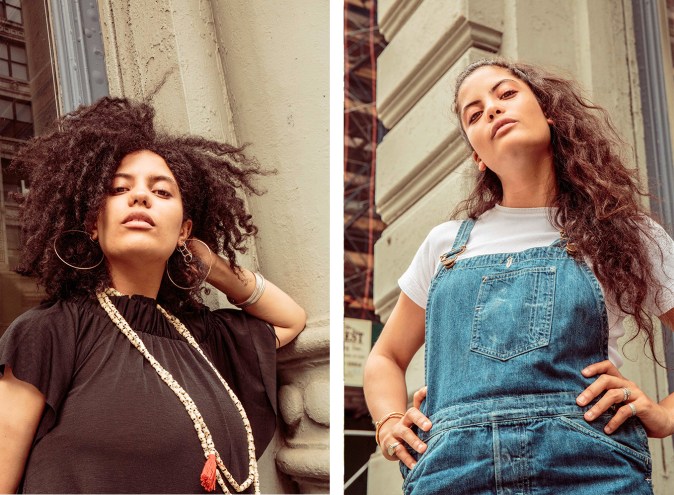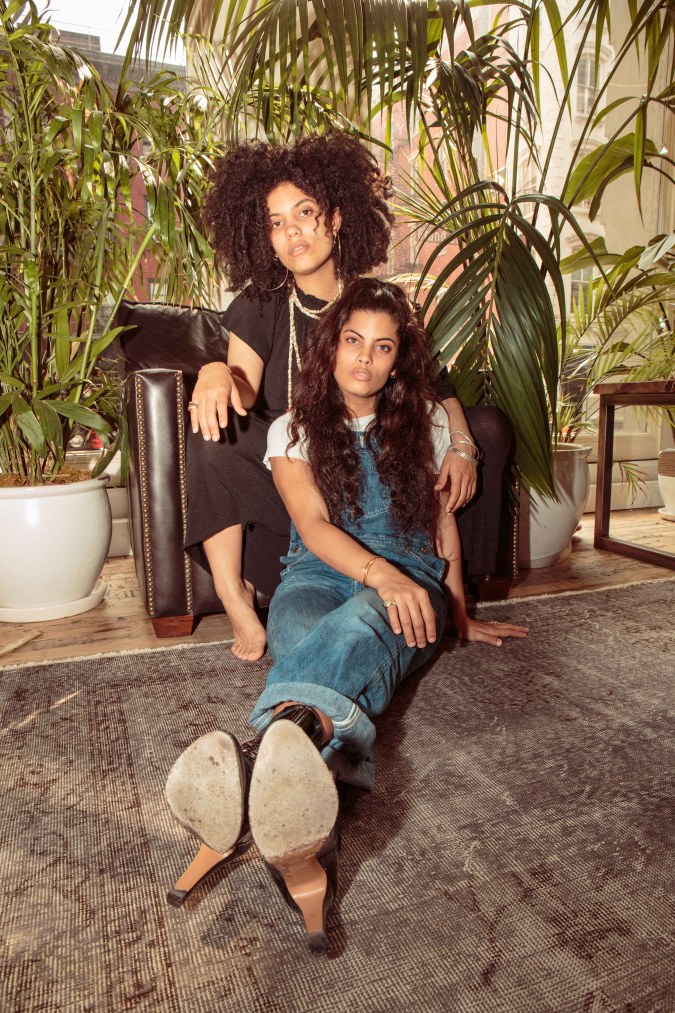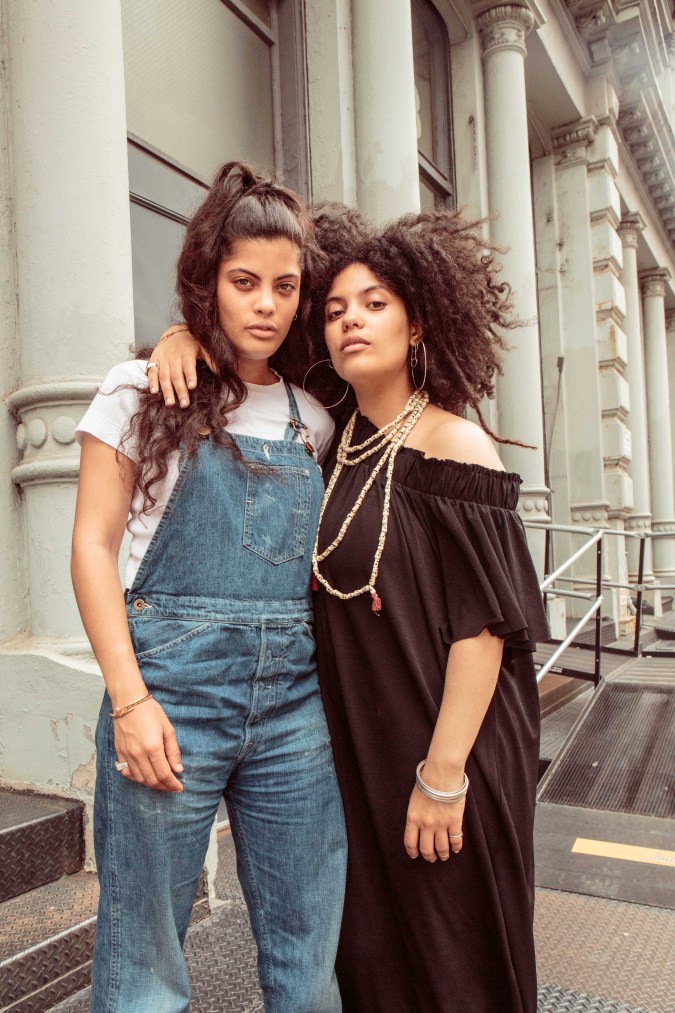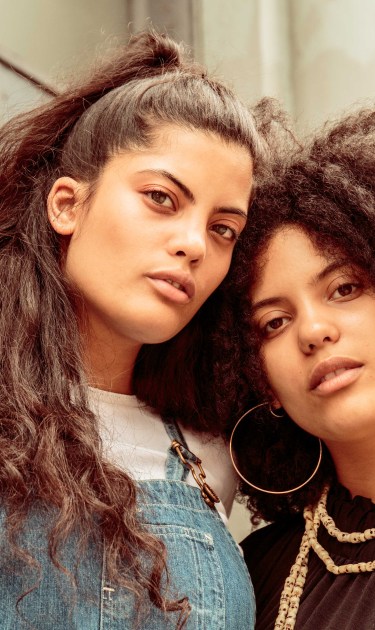In 2006, Miguel “Angá” Díaz suffered a heart attack and died at his home in Barcelona. Just 45 years old, Díaz had already established himself as a virtuosic and innovative percussionist, with stints in Irakere and the Afro-Cuban All Stars, the latter of which shared members with Buena Vista Social Club. A legendary conguero with Yoruba roots, he also played the güira, timbales, and the cajón.
The day after his death, his 11-year-old daughter Naomi played the cajón for the first time. To hear her play now, with her twin sister Lisa-Kaindé, is to hear her father’s spirit. To hear the music of Ibeyi is to hear the spirits of enslaved people stolen from Africa and brought to the Caribbean over the middle passage, filtered through the lens of Spanish colonialism and French Enlightenment. They lie at the intersection of the African diaspora, elegantly weaving West African rhythms with modern jazz, soul, and hip-hop in minimalistic arrangements imbued with a rich history. And rarely has that history sounded so beautiful.
Ibeyi’s first, self-titled LP was a haunting reflection of their past, the weight they carried after the deaths of their father and sister. Discovered as teenagers by XL Recordings label boss Richard Russell, the sisters developed a sparse and distinctive musical identity, weaving organic piano and percussion sounds with electronic beats and samples. After touring the world behind their debut album, they settled in to write their next chapter. If Ibeyi gazed inward, reflecting on their past, their new LP, Ash, looks outward towards the future, and balances the scales.

“Our whole work, Naomi and I, it’s about finding balance,” Lisa-Kaindé tells us on a recent visit to the Remezcla office in Brooklyn. “That’s the most important thing. Balance between her and me, balance between our heritage and the music that we discover everyday…and at the same time, [to] find a way to play them and explain them in a way that it’s still joyful.”
“That’s the most important thing: Balance between her and me, balance between our heritage.”
The Parisian-born sisters spent time in Havana — where they now own a home — but were raised in the French capital with their mother, the French-Venezuelan singer Maya Dagnino. To them, their father’s influence is felt strongest in their subconscious synthesis of disparate genres, the willingness to ignore preconceived notions of what goes together.
That perspective is evident in Angá’s music, no more so than in his sole solo LP, 2005’s Echu Mingua. Over 13 tracks, he flexes traditional Cuban son chops and incorporates Yoruba call-and-response into hip-hop, jazz, and salsa rhythms. He brought on the French DJ Dee Nasty, who chopped up samples and turns turntable scratches into musical accompaniment. He freaks jazz standards like Coltrane’s “A Love Supreme” and Monk’s “Round Midnight” to the point that they’re only barely recognizable. It’s a landmark recording, the truest encapsulation of Angá Díaz, the artist — the kind of record that gives room for artists like Ibeyi to exist.



“Listening back to his album…there’s Latin jazz, there’s jazz, there’s hip-hop, there’s African music, there’s Yoruba, there’s DJs, there’s reggae…everything he liked,” Lisa-Kaindé says. “He was not one of those jazz men who [said] ‘I hate pop,’ no. He would dance to Prince for hours. I think that’s what he gave us, to like every type of music we liked and not be ashamed.”
Their eclecticism has certainly shaped their sound, but it’s their connection to their Yoruba heritage and spirituality, specifically, that has resonated with many Latinx fans across the African diaspora. The Yoruba people’s spiritual practices originated in Nigeria, Benin, and Togo, but arrived in Cuba through the trans-Atlantic slave trade. The persistence of Yoruba spiritual practices today serves to highlight Latinxs’ longstanding African roots, and artists like Ibeyi serve as an antidote to the continuing erasure of Afro-Latinx people.
“Yoruba exists in Cuba because of slaves who continued to sing these songs,” Lisa-Kaindé explains. ”[For] everybody who incorporates it in their music, it will be important for them, it will be truthful. It would make a writing on the wall, and the more writings on the wall, the more people from that culture will connect with it again.”


And while their Afro-Cuban father was the one with Yoruba roots, it was their mother that exposed them to the music. Before Maya met Angá, before she had ever been to Cuba, she was invited to a Yoruba singing class at 18 and was immediately consumed. When Maya and Angá were initiated into the faith, the sisters were there, participating in their first ceremony from within their mother’s womb. When they were 16, she took the twins to a Yoruba choir practice — initially reluctant, once they heard the music, they immediately fell in love.
Ibeyi have looked through themselves to their ancestors, and found strength to forge a new future.
“When you sing Yoruba, you feel something,” Lisa-Kaindé explains. “When you see an audience singing Yoruba and you have no idea what Yoruba is, they feel it. You can see it in their eyes. What’s incredible is that it’s like singing jazz standards — you hear a thousands of women who have sang that, you hear the old man who sang that, behind your head.”
Yoruba spirituals became a part of their lives, and naturally bled into the music. “Eleggua,” which opens their first LP, comes directly from the prayers in their home. On Ash, they’ve become even more adept at blending Yoruba spirituality with their pop inclinations — the title track even takes the bold step of adding an auto-tune filter to the traditional chants. As they played the new songs for the first time at their label office in Manhattan ahead of the album’s release, the THUMP of Naomi’s cajón was powerful in a way we did not expect — spiritually moving, yes, but also physically, a transference of energy carrying the weight of multiple generations.

Ash represents the latest step in Ibeyi’s maturation. It features “Me Voy,” their first song completely in Spanish, a collaboration with the fierce Spanish rapper Mala Rodriguez, as well as several other collaborators — Meshell Ndegeocello, Chilly Gonzales, and Kamasi Washington, all of whom exhibit the vast scope of influence on their music. They incorporate the words of strong women that inspire them, from Michelle Obama and Suzanne Mallouk (“No Man Is Big Enough For My Arms”), to their mother and Frida Kahlo (“Transmission/Michaelion”). Naomi’s gorgeous rasp finally takes center stage, on “Waves,” as does Lisa-Kaindé’s admiration for her sister’s free spirit, on “I Wanna Be Like You.” More than anything, Ash is evidence of two artists who have looked through themselves to their ancestors, and found the strength to forge a new future. At 22 years old.
As their profile is raised, so too is Yoruba culture’s. You can already see Ibeyi’s direct influence on the diaspora; in 2016 the Alvin Ailey American Dance Theater debuted a hip-hop ballet set to their music. And after their appearance in Beyoncé’s Lemonade film — which also incorporated Yoruba aesthetics, like body paint by visual artist Laolu Senbanjo and allusions to the goddess Oshún — they say some even got it twisted and thought their Yoruba influences were inspired by Beyoncé. But it doesn’t faze them — in fact, they see it as a connection to the larger African diaspora.
“When we come here, black African people…they know they come from Africa but they don’t know where,” Lisa-Kaindé says. “They come to our shows and start singing Yoruba. That’s why it’s important…going back to your roots and mixing it with who you are, it’s diversity. So, if you feel like Yoruba is part of you, use it. But don’t do it like everybody does it, find your own way to do it. Diversity is what’s going to change the world.”
For Latinx people with African roots — especially those whose connections to the continent have been suppressed culturally or even legally — that diversity represents more than just lip service or the monetization of an underserved demographic. This is music that calls out to unknown ancestors that can only be felt, and tells of a stolen history passed on through songs that would otherwise be lost forever. Its mere existence is an act of rebellion — the record of a people who refuse to be forgotten.
Ibeyi’s Ash is out now on XL Recordings.




